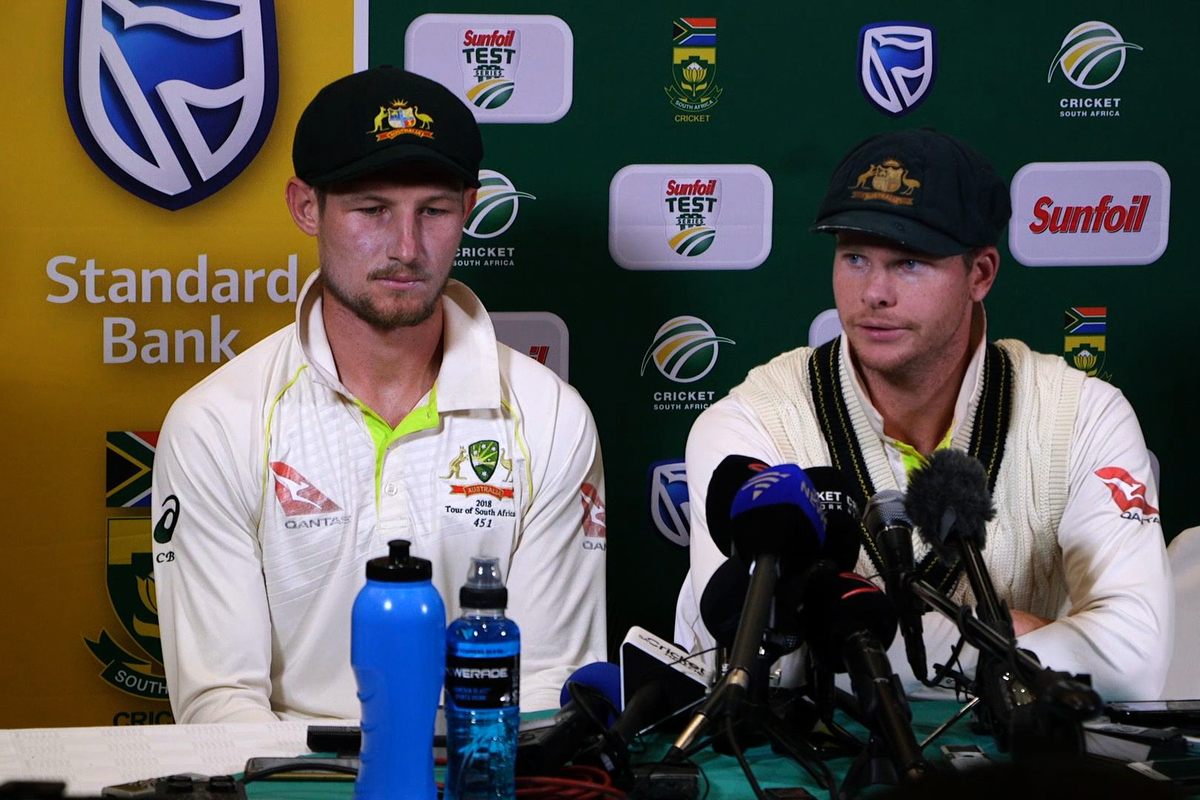REFUSING TO allow the suspended cricketers any reprieve might be a no-mercy call but it’s the right one, says Chief Writer RON REED:
CORRECT decision, Cricket Oz. Having done the crime, Steve Smith, David Warner and Cameron Bancroft are going to have to do the time after the game’s governors decided on Tuesday to reject the Australian Cricketers Association’s request – more of a demand, really – to water down their bans for bringing the game into disrepute over the infamous ball-tampering episode in South Africa.
This will, of course, inflame the whole controversy all over again, ensuring one of the most painful years in Australian cricket history will continue to smoulder for what’s left of it, and perhaps all the way through to next year’s double bill in England, the World Cup and the Ashes, when the three players’ right to be selected on their merits will again be an issue, although hopefully a reasonably benign one once the suspensions have expired and the heat has dissipated.
But that’s still some distance away and, in the meantime, those people who believe the trio have been hard done by – and there are plenty of them out there – will continue to make loud noise.

That is now a futile exercise, with the board making it clear the case is now closed.
You can please yourself whether you think the No 1 priority as this seismic summer continues to unfold should be beating India or repairing the damage to the image of Australian cricket, and whether either is actually achievable. Certainly, both will be downright difficult.
But the on-field outcome isn’t really in Australia’s control – the powerful tourists will be having plenty to say about that.
The matter of “culture” is much more manageable, or should be, and the new-look board of directors – minus former chairman David Peever and, regrettably, former Test captain and wise counsel Mark Taylor – have no choice but to show clearly and unambiguously that they are fair dinkum about it.
That wouldn’t be achieved by backsliding now on the issue that is at the heart of the problem. It wouldn’t be a good look for a range of reasons, not least that it would make them appear willing to water down – under political pressure from the players’ union – the principles they applied when the bans were applied in the first place.
Much of the groundswell of support has centred around a suggestion that the exiles should be allowed back into the Sheffield Shield after Christmas, but not the Test arena. But what would that achieve, other than making it easier to force their way back into the national teams when the time comes? But that would, again, just look like CA is willing to compromise on principle if it suits the competitive agenda.
It is also worth remembering that the three all accepted the punishments at the time and made no attempt to dispute them. Nor did the scathing Ethics Centre review recommend any change.
The attempt was made on their behalf by the players’ union, which did so aggressively, provocatively and loudly when it might have been better for all concerned if they had made their approaches in a more diplomatic fashion. That almost certainly would not have changed the outcome, but it might have toned down the unfortunate impression that the game is still at civil war with itself.
The union seems to believe that they have the cricket public on their side but this is definitely disputable – most readings of social media and the letters columns in newspapers would suggest that popular sentiment is strongly against the bans being, well, tampered with.
Smith, Warner and Bancroft can, in fact, consider themselves lucky to have been treated as fairly as they have been. When people get banned for whatever reason in other high-profile sports, it is usually absolute – they cannot participate in any way, either directly or by association. To digress, that’s how it was when Shane Warne got a year for using a banned diuretic by mistake – he wasn’t even allowed to practice in any official environment. He reveals in his new book, No Spin, that he went to the lengths of persuading a mate to open a rural indoor cricket centre before dawn to accommodate him before it was locked up after his sessions and re-opened to the public later in the morning.
These three have been allowed to play with their clubs, train with their state squads and earn very good money as mercenaries on the international Twenty20 circuit. That’s not exactly the equivalent of hard labour in prison.
It should be fully acknowledged that – with the exception of one minor blip when Warner walked off the field because he was being sledged — they have taken it on the chin and behaved immaculately. They have put plenty back into the game, demonstrating their genuine love for it. That is greatly to their credit and should be applauded.
But they have still not fully answered for the damage that they caused and the time has arrived for their supporters to allow that to run its course – peacefully.
RON REED has spent more than 50 years as a sportswriter or sports editor, mainly at The Herald and Herald Sun. He has covered just about every sport at local, national and international level, including multiple assignments at the Olympic and Commonwealth games, cricket tours, the Tour de France, America’s Cup yachting, tennis and golf majors and world title fights.


Discussion about this post